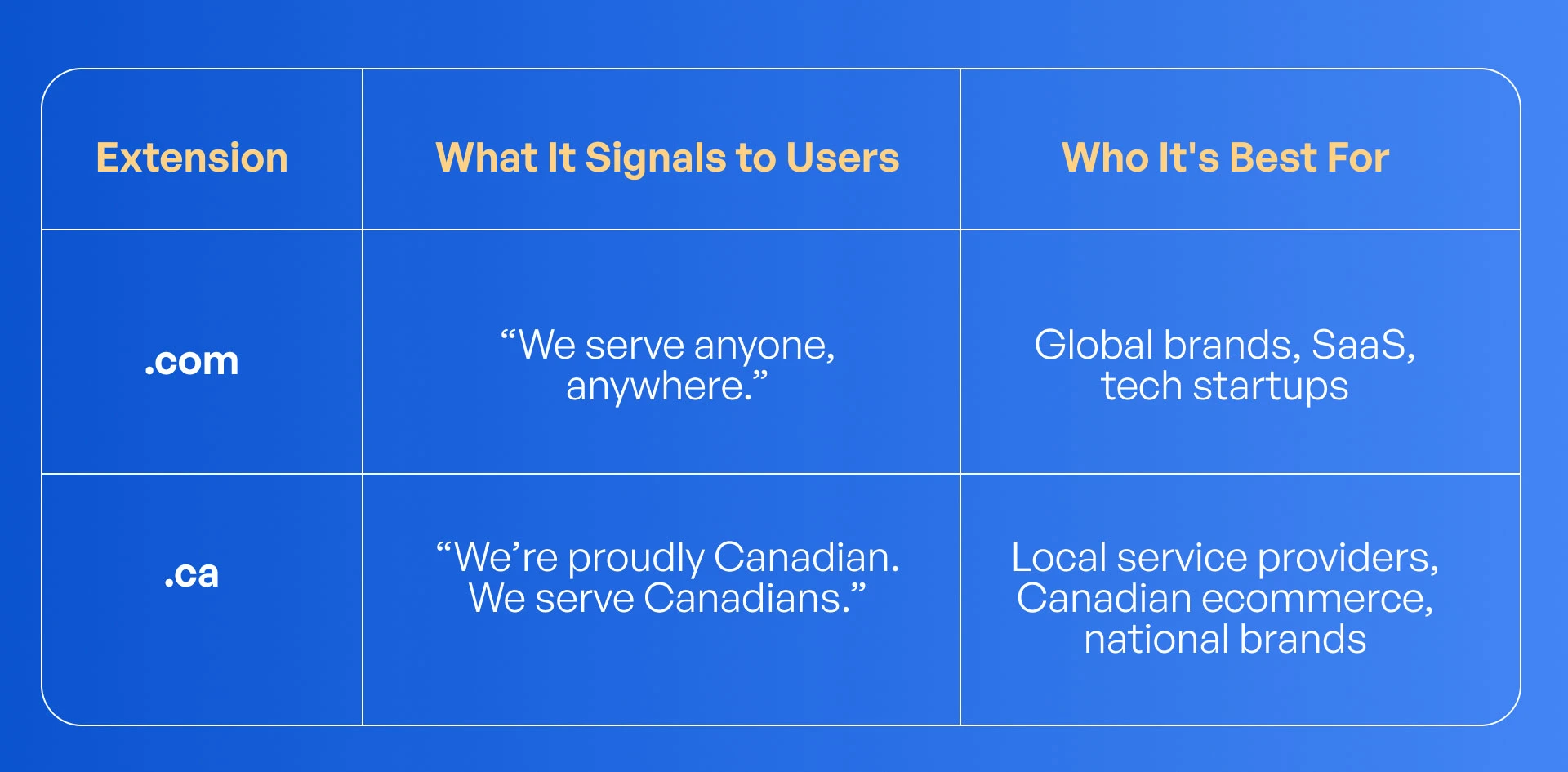TABLE OF CONTENTS
The Basics: What Do .com and .ca Mean?
Quick Visual: What Each Extension Tells the User
The Difference Between .ca vs .com:
When Should You Use a .ca Domain?
You’re Targeting Canadian Customers
You Want to Build a Proudly Canadian Brand
When Should You Use a .com Domain?
You Sell Outside of Canada (or Plan To Soon)
You’re Building a SaaS, Tech, or Digital-First Brand
CA vs COM: Which Domain Extension is Right for Your Business?
So imagine this, you’ve locked in the perfect business name. You’re ready to launch your website. But then comes the question: Should you register a .ca or a .com domain? It seems simple enough, but the choice you make here can shape how your brand is perceived, how it ranks in search engines, and how effectively it connects with your target audience.
So imagine this, you’ve locked in the perfect business name. You’re ready to launch your website. But then comes the question:
Should you register a .ca or a .com domain?
It seems simple enough, but the choice you make here can shape how your brand is perceived, how it ranks in search engines, and how effectively it connects with your target audience. Especially if you're a Canadian business, this decision is more strategic than you might think.
In this article, we’ll guide you through the fundamental differences between .ca and .com, explain how each impacts your business, and provide guidance on choosing the one that aligns with your growth plans.
Let’s get right in.
The Basics: What Do .com and .ca Mean?
Some people use domain extensions like .com and .ca interchangeably. But they carry very different meanings.
Let’s break it down.
.COM: The Global Standard
The .com domain is short for “commercial,” and it has been around since the mid-1980s. It was initially intended for businesses operating in commerce, hence the name. However, today, it’s the most recognized domain extension in the world.
It’s popular because it’s familiar. People instinctively type “.com” into browsers. It’s what most users expect when they hear a brand name. Because of this ubiquity, .com often feels more established or authoritative, especially to international audiences.
That said, because .com domains have been around for decades, many short or simple names are already taken. If your brand name is common, you may need to get creative, or consider using a different extension.
.CA: The Canadian Signature
The .ca domain is Canada’s official domain extension, managed by the Canadian Internet Registration Authority (CIRA). It’s only available to Canadian individuals, businesses, or entities that meet CIRA’s requirements.
In other words, you must be a Canadian citizen, permanent resident, or have a business or organization registered in Canada to own a .ca domain, which makes it a meaningful distinction.
If someone sees .ca, they instantly understand:
- This brand is based in Canada
- They probably ship locally
- No cross-border surprises
If you have customers shopping from Canada, this local angle can build instant trust and confidence.
Quick Visual: What Each Extension Tells the User

Let’s now take a look at some of the key differences between .ca and .com.
The Difference Between .ca vs .com
At a technical level, .com and .ca are just domain extensions (characters at the end of a web address). However, when it comes to branding, perception, and performance, those letters are important.
Here’s how these two domains differ:
- Audience Reach
.com is international. It’s not tied to any country, and that’s part of its appeal. If your customers are global or you plan to expand outside of Canada, .com gives you flexibility.
.ca is Canada-specific. So, if your audience is primarily domestic, then .ca strengthens that local connection.
- Trust and Credibility
People trust what feels familiar, and in Canada, .ca domains carry a certain cultural weight.
Canadians are more likely to assume:
- The business is local
- Pricing is in CAD
- Shipping will be faster
Meanwhile, .com still feels more “official” in some industries, especially in tech, SaaS, or global ecommerce. It’s the domain of Silicon Valley startups, global apps, and international stores.
Summarily, both inspire trust, but in slightly different ways, depending on who you’re speaking to.
- SEO and Discoverability
Google uses domain extensions to help determine who your site is most relevant to. A .ca domain tells search engines that your site should rank more prominently on google.ca, and this is particularly great if you’re focused on local SEO.
A .com domain doesn’t carry that geographic bias, which makes it better for broader or international search rankings.
So if your strategy is to dominate search results in Canada, .ca gives you a better edge. If you’re optimizing globally, we recommend using .com.
- Availability and Flexibility
.com domains are in high demand. Many of the good ones are already in use or selling for thousands of dollars.
.ca still has more availability. If your ideal brand name is taken in .com, there’s a solid chance it’s still available in .ca.
Note: If your domain is taken in .com but .ca is available, you don’t have to rework your brand; you simply need to claim the .ca.
When Should You Use a .ca Domain?

As already established, if your business is Canadian and your audience is primarily Canadian, a .ca domain is often the better strategic choice.
Below are other situations when you should use a .ca domain:
You’re Targeting Canadian Customers
This is the most apparent reason to choose a .ca: your customers are in Canada, and you want to be instantly recognized as a local brand.
Examples:
- A dental clinic in Vancouver
- A boutique fitness studio in Toronto
- A skincare brand that ships only within Canada
You're Focused on Local SEO
Google favours location-based domain extensions when serving up local search results. If you’re trying to rank for things like “best wedding photographer in Toronto” or “Montreal accounting services,” having a .ca domain gives you a small but important SEO advantage in Canadian search.
It shows both Google and your visitors that you’re relevant to that market.
You Want to Build a Proudly Canadian Brand
There’s also the matter of identity. A .ca domain aligns with national branding and lets you establish your presence, especially if you’re building your brand around values like sustainability, community, or supporting Canadian suppliers.
If part of your appeal is that your product is Canadian-made, locally sourced, or family-run in Canada, the .ca extension reinforces that story from the very start.
When Should You Use a .com Domain?

If you’re building a business with eyes beyond one country, .com is the better choice. Here are a few situations where using .com makes the most sense:
You Sell Outside of Canada (or Plan To Soon)
Maybe you’re a Canadian-based skincare brand shipping across North America, or a digital product creator with buyers in the U.S., UK, and Australia.
Even if Canada is your home base, if your customers are spread across regions, a .com domain prevents you from sounding “too local.”
You’re Building a SaaS, Tech, or Digital-First Brand
If you’re launching an app, a software platform, or any tech-oriented product, .com is the standard. Investors, media, and early adopters expect it. It’s what feels “native” in the startup and SaaS space.
Even if you’re based in Toronto or Vancouver, using .com signals that borders don’t confine your brand.
You Want Long-Term Brand Flexibility
Choosing a .ca domain ties your identity closely to Canada. And that’s great, if your growth plans are Canadian.
But what if you expand? What if:
- You open a fulfillment center in the U.S.
- You launch French-language marketing in Europe
- A global distributor wants to partner with you
With .com, you don’t have to limit yourself. Your brand can grow freely without needing to rebrand or shift digital assets later on.
What About Owning Both?
If you’re debating between .ca and .com, here’s a thought: why not own both?
If you register only one version, there’s always the risk that someone else will grab the other. That “someone” might be a domain reseller trying to resell it back to you at a high price, or a completely unrelated brand, which could confuse your customers. Owning both gives you control over your name, and your reputation.
There’s also the practical benefit of redirecting traffic. Maybe you’ve built your site on a .ca domain, but someone hears about your business and types in .com by default. If you own both, you can redirect .com traffic to .ca (or vice versa), ensuring people always land where they’re supposed to. It’s a simple way to avoid missed opportunities.
Beyond that, owning both gives you room to grow. Even if you’re Canada-focused now, you might expand into international markets later. Having the .com already secured means you’re ready to scale without having to rebrand or find an available domain.
Some businesses even use both domains deliberately for different audiences. For instance, you might use your .ca for local marketing campaigns, Canadian pricing, and region-specific promotions, while reserving your .com for international buyers, global PR, or wholesale inquiries. It’s a way to tailor your messaging without diluting your brand.
Final Verdict: .ca vs .com—What’s Right for You?
If your business is primarily focused on serving a Canadian audience, .ca domain is the practical choice. On the other hand, if your company has international ambitions, or already serves customers outside of Canada, then use .com.
However, if both are available, we recommend getting them.
It’s a low-cost investment that offers long-term flexibility, brand protection, and peace of mind. And if you’re unsure how to use them strategically, like how to redirect traffic, prioritize one for SEO, or split your marketing, we’re here to help.
Book a free strategy call, and we’ll walk you through the smartest setup for your business and growth goals.






.svg)

.avif)


.svg)




